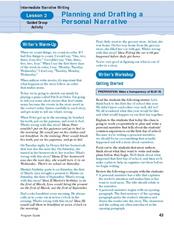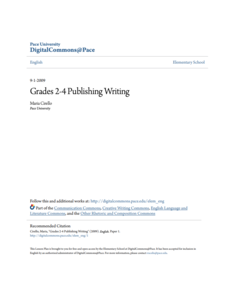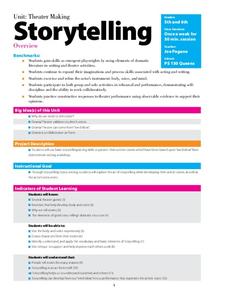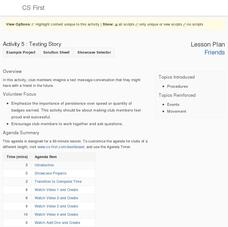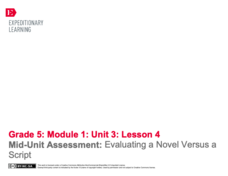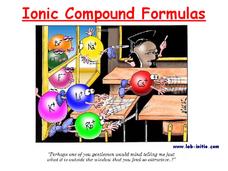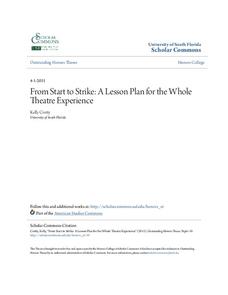EngageNY
Our Group Readers Theater: Revision, Conclusion, and First Rehearsal
Revision is the key to great writing. Individuals revise their readers theater scripts and write a group conclusion. Scholars then perform their scripts for another group and receive feedback.
EngageNY
Writing the First Draft of the Readers Theater Script
Scholars analyze a model Readers Theater script. Then, small groups read their scripts aloud to help determine where they need to make revisions.
Portland Public Schools
Opinion: Persuasive Essay Unit Introduction
Opinion, audience, purpose. Fourth graders are introduced to the three characteristics of persuasive writing in the third unit of a year-long writing program. The 98-page packet is complete with plans, model essays, graphic organizers,...
EngageNY
Readers Theater: Writing a Conclusion
That's all, folks! Scholars work with their group members to create conclusions for their To Kill A Mockingbird reader's theater scripts. They use a criteria list to help guide their conclusion writing and discuss how the conclusions...
EngageNY
Our Group Readers Theater: Managing the Sequence of Events in Our Script
Go with the flow. Scholars learn how using transition words and phrases helps their scripts flow smoothly. Readers think about connecting each section after determining the sequence for their readers' theater manuscripts from To Kill A...
Santa Ana Unified School District
Persuasive Writing
Should students be paid for doing well in school? That is the question at the heart of an argumentative writing unit that walks writers through the steps of crafting a persuasive essay. The carefully scaffolded scripted plans provide...
Teach It Primary
The Pied Piper of Hamelin
Six tasks make up a lesson plan designed to reinforce comprehension and language skills using the poem "The Pied Piper" by Robert Browing. Scholars discuss and define unknown words, identify adjectives and onomatopoeia, review...
EngageNY
Drafting Individual Readers Theater Scripts for a Specific Scene: Rephrasing, Narrator Introduction, and Identifying Characters
Read, revise, refine! Scholars refine their readers theater scripts by rephrasing some of the lines. Next, they write drafts of their narrator introductions and share their work with peers to give and receive feedback.
Oakland Unified School District
Class Animal Report
Whether preparing your second graders for an expository writing proficiency assessment or just planning on introducing the writing process, this 37-page packet is for you. The unit has everything you need from scripted lessons to...
Teaching Tolerance
Puppet Show
It's a play, it's a story, it's a puppet show! A lively resource provides academics with a creative outlet to express their views on diversity and social justice. Scholars are responsible for writing, creating, and performing a puppet...
Ford's Theatre
How Perspective Shapes Understanding of History
The Boston Massacre may be an iconic event in American history, but perhaps the British soldiers had another point of view. Using primary sources, including reports from Boston newspapers and secondary sources from the British...
Curated OER
Planning and Drafting a Personal Narrative
Bring your learners together to write a class narrative about the first day of school. Start off by teaching them about sequence with a quick oral activity. Then, work together to fill out a story map. Finally, compose the class...
Pace University
Publishing Writing
Scholars become familiar with tagline literature with the help of the story, Alexander and the Horrible, No Good, Very Bad, Terrible Day by Judith Viort. After a read-aloud and whole-class discussion, leveled groups complete...
Brigham Young University
Introducing the Text and Learning the Process of Script Analysis
Where do directors and set designers get their ideas so that the set they build creates the mood and atmosphere the director wants for a production? From the script! Introduce theater high schoolers to the script analysis techniques used...
New York City Department of Education
Theater Units for Lower and Upper Elementary Levels
Introduce middle schoolers to playwriting and the elements of drama with a six-session storytelling unit that encourages kids to expand their acting and writing skills. The 12-page packet includes overviews of the lessons,...
Google
Friends: Texting Story
Sometimes it's okay to text in school. Young computer scientists work in the Scratch program to write a text message conversation among friends. They use different sprites within the program to represent each side of the conversation to...
EngageNY
Mid-Unit Assessment: Evaluating a Novel Versus a Script
How are novels and scripts alike and different? As part of the mid-unit assessment, scholars complete a Venn diagram to compare two types of writing: a novel and a script. Next, they respond to short-answer questions, evaluating passages...
EngageNY
End of Unit Assessment: Individual Sections of Readers Theater Script
Let's play! Pupils create titles for their readers theater scripts and act them out in a fun game of charades. Next, as part of their end of unit assessment, they write final copies of their individual scripts.
EngageNY
End of Unit 3 Assessment: Readers Theater Commentary
Prove it! In the end-of-unit assessment, scholars write a commentary and provide evidence to justify the connection between their reader's theater scripts and To Kill A Mockingbird. After completing the assessment, they practice...
David Elementary
Structural Elements of Drama
The world may indeed be a stage, and players certainly need to know drama vocabulary. This list of 16 terms (and their definitions) often found in scripts will prompt actors to perform their role.
Science Geek
Ionic Compound Formulas
By contrasting cations and anions, this presentation shows how to predict ionic charges by periodic groups. The slides conclude with a few guided practice problems for writing ionic compound formulas.
Scholastic
Tell Us a Tale: Teaching Students to Be Storytellers
Encourage scholars to retell their favorite short story or folktale, adding personal details to make it their own. After reading their book of choice several times, story tellers retell a tale verbally to their classmates.
Honors College at Scholar Commons
From Start to Strike: A Lesson Plan for the Whole Theatre Experience
Introduce young thespians to all aspects of the theater. A syllabus for a one-semester drama course provides lessons that take learners from the history of drama to the many facets of play production.
Into Films
Filmmaking Guide
Pixar, DreamWorks, Disney Studios. Prepare your primary graders to become the next generation of film makers with a guide that encourages kids to explore the possibilities of script writing, lighting, sound, editing, and post...
Other popular searches
- Play Script Writing
- Writing a Script
- Film Script Writing
- Script Writing Rubric
- Writing a Play Script
- Teaching Script Writing
- Commercial Script Writing
- Script Writing Conventions
- Drama Script Writing
- Teaching Play Script Writing
- Writing a Commercial Script
- Chinese Script Writing











